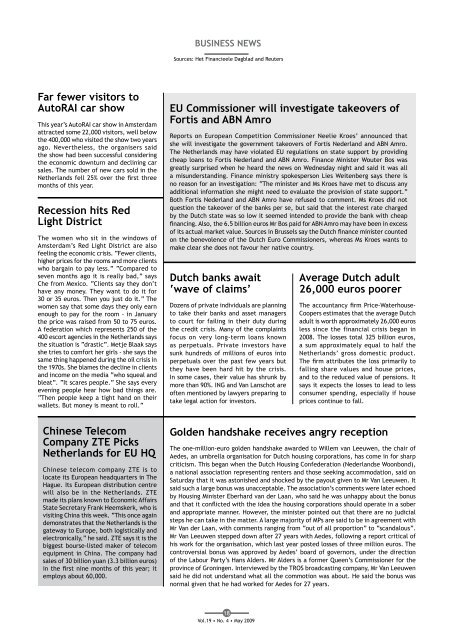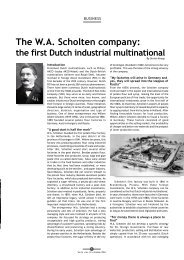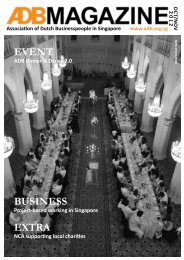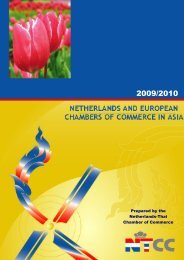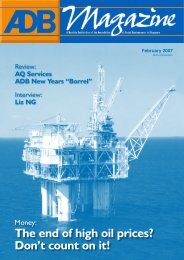May 2009 - Association of Dutch Businessmen
May 2009 - Association of Dutch Businessmen
May 2009 - Association of Dutch Businessmen
You also want an ePaper? Increase the reach of your titles
YUMPU automatically turns print PDFs into web optimized ePapers that Google loves.
Business news<br />
Sources: Het Financieele Dagblad and Reuters<br />
Far fewer visitors to<br />
AutoRAI car show<br />
This year’s AutoRAI car show in Amsterdam<br />
attracted some 22,000 visitors, well below<br />
the 400,000 who visited the show two years<br />
ago. Nevertheless, the organisers said<br />
the show had been successful considering<br />
the economic downturn and declining car<br />
sales. The number <strong>of</strong> new cars sold in the<br />
Netherlands fell 25% over the first three<br />
months <strong>of</strong> this year.<br />
Recession hits Red<br />
Light District<br />
The women who sit in the windows <strong>of</strong><br />
Amsterdam’s Red Light District are also<br />
feeling the economic crisis. “Fewer clients,<br />
higher prices for the rooms and more clients<br />
who bargain to pay less.” “Compared to<br />
seven months ago it is really bad,” says<br />
Che from Mexico. “Clients say they don’t<br />
have any money. They want to do it for<br />
30 or 35 euros. Then you just do it.” The<br />
women say that some days they only earn<br />
enough to pay for the room - in January<br />
the price was raised from 50 to 75 euros.<br />
A federation which represents 250 <strong>of</strong> the<br />
400 escort agencies in the Netherlands says<br />
the situation is “drastic”. Metje Blaak says<br />
she tries to comfort her girls - she says the<br />
same thing happened during the oil crisis in<br />
the 1970s. She blames the decline in clients<br />
and income on the media “who squeal and<br />
bleat”. “It scares people.” She says every<br />
evening people hear how bad things are.<br />
“Then people keep a tight hand on their<br />
wallets. But money is meant to roll.”<br />
Chinese Telecom<br />
Company ZTE Picks<br />
Netherlands for EU HQ<br />
Chinese telecom company ZTE is to<br />
locate its European headquarters in The<br />
Hague. Its European distribution centre<br />
will also be in the Netherlands. ZTE<br />
made its plans known to Economic Affairs<br />
State Secretary Frank Heemskerk, who is<br />
visiting China this week. “This once again<br />
demonstrates that the Netherlands is the<br />
gateway to Europe, both logistically and<br />
electronically,” he said. ZTE says it is the<br />
biggest bourse-listed maker <strong>of</strong> telecom<br />
equipment in China. The company had<br />
sales <strong>of</strong> 30 billion yuan (3.3 billion euros)<br />
in the first nine months <strong>of</strong> this year; it<br />
employs about 60,000.<br />
EU Commissioner will investigate takeovers <strong>of</strong><br />
Fortis and ABN Amro<br />
Reports on European Competition Commissioner Neelie Kroes’ announced that<br />
she will investigate the government takeovers <strong>of</strong> Fortis Nederland and ABN Amro.<br />
The Netherlands may have violated EU regulations on state support by providing<br />
cheap loans to Fortis Nederland and ABN Amro. Finance Minister Wouter Bos was<br />
greatly surprised when he heard the news on Wednesday night and said it was all<br />
a misunderstanding. Finance ministry spokesperson Lies Weitenberg says there is<br />
no reason for an investigation: “The minister and Ms Kroes have met to discuss any<br />
additional information she might need to evaluate the provision <strong>of</strong> state support.”<br />
Both Fortis Nederland and ABN Amro have refused to comment. Ms Kroes did not<br />
question the takeover <strong>of</strong> the banks per se, but said that the interest rate charged<br />
by the <strong>Dutch</strong> state was so low it seemed intended to provide the bank with cheap<br />
financing. Also, the 6.5 billion euros Mr Bos paid for ABN Amro may have been in excess<br />
<strong>of</strong> its actual market value. Sources in Brussels say the <strong>Dutch</strong> finance minister counted<br />
on the benevolence <strong>of</strong> the <strong>Dutch</strong> Euro Commissioners, whereas Ms Kroes wants to<br />
make clear she does not favour her native country.<br />
<strong>Dutch</strong> banks await<br />
‘wave <strong>of</strong> claims’<br />
Dozens <strong>of</strong> private individuals are planning<br />
to take their banks and asset managers<br />
to court for failing in their duty during<br />
the credit crisis. Many <strong>of</strong> the complaints<br />
focus on very long-term loans known<br />
as perpetuals. Private investors have<br />
sunk hundreds <strong>of</strong> millions <strong>of</strong> euros into<br />
perpetuals over the past few years but<br />
they have been hard hit by the crisis.<br />
In some cases, their value has shrunk by<br />
more than 90%. ING and Van Lanschot are<br />
<strong>of</strong>ten mentioned by lawyers preparing to<br />
take legal action for investors.<br />
Average <strong>Dutch</strong> adult<br />
26,000 euros poorer<br />
The accountancy firm Price-Waterhouse-<br />
Coopers estimates that the average <strong>Dutch</strong><br />
adult is worth approximately 26,000 euros<br />
less since the financial crisis began in<br />
2008. The losses total 325 billion euros,<br />
a sum approximately equal to half the<br />
Netherlands’ gross domestic product.<br />
The firm attributes the loss primarily to<br />
falling share values and house prices,<br />
and to the reduced value <strong>of</strong> pensions. It<br />
says it expects the losses to lead to less<br />
consumer spending, especially if house<br />
prices continue to fall.<br />
Golden handshake receives angry reception<br />
The one-million-euro golden handshake awarded to Willem van Leeuwen, the chair <strong>of</strong><br />
Aedes, an umbrella organisation for <strong>Dutch</strong> housing corporations, has come in for sharp<br />
criticism. This began when the <strong>Dutch</strong> Housing Confederation (Nederlandse Woonbond),<br />
a national association representing renters and those seeking accommodation, said on<br />
Saturday that it was astonished and shocked by the payout given to Mr Van Leeuwen. It<br />
said such a large bonus was unacceptable. The association’s comments were later echoed<br />
by Housing Minister Eberhard van der Laan, who said he was unhappy about the bonus<br />
and that it conflicted with the idea the housing corporations should operate in a sober<br />
and appropriate manner. However, the minister pointed out that there are no judicial<br />
steps he can take in the matter. A large majority <strong>of</strong> MPs are said to be in agreement with<br />
Mr Van der Laan, with comments ranging from “out <strong>of</strong> all proportion” to “scandalous”.<br />
Mr Van Leeuwen stepped down after 27 years with Aedes, following a report critical <strong>of</strong><br />
his work for the organisation, which last year posted losses <strong>of</strong> three million euros. The<br />
controversial bonus was approved by Aedes’ board <strong>of</strong> governors, under the direction<br />
<strong>of</strong> the Labour Party’s Hans Alders. Mr Alders is a former Queen’s Commissioner for the<br />
province <strong>of</strong> Groningen. Interviewed by the TROS broadcasting company, Mr Van Leeuwen<br />
said he did not understand what all the commotion was about. He said the bonus was<br />
normal given that he had worked for Aedes for 27 years.<br />
18<br />
Vol.19 • No. 4 • <strong>May</strong> <strong>2009</strong>


